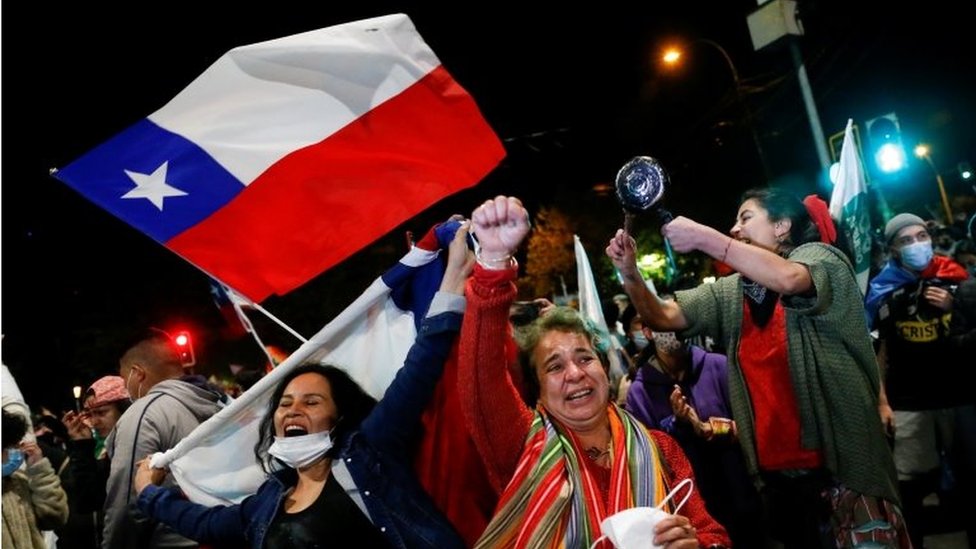
.
The undercurrents of history look for a way to surface. That is what happened a year ago in Chile on November 15th 2019.
After almost a month of intensive street protests, Chilean political parties agreed to a referendum on replacing the country’s Pinochet-era constitution. A thirty-peso increase in public transport fees had triggered an outpouring of complaints about decades of corruption, inequality and repression. Chile – the poster child for unrestrained neoliberalism – was to be asked if it wanted to take a first step back towards social democracy.
The existing constitution enshrines the commodification of rights and the concentration of elite power without accountability. Public demands for social rights: healthcare, work, housing, education, and social security proved impossible to progress because Chile’s constitution (written by a right wing dictator) was purposely designed to resist such claims.
For 30 years the Chilean state had left the stage and allowed the private sector to accumulate and defend its own concentrations of power. Ordinary Chilean citizens finally reached a breaking point and demanded a constitution that placed social solidarity ahead of the greed of powerful elites.
Since the concession of the referendum, protestors have faced brutal repression by the corrupt, militarized police and the movement has been the target of widespread governmental / corporate media smears and disinformation. No wonder all hopes are set on the process of change that is underway. While this does not mean the imminent end of neoliberalism in Chile, at the very least it looks set to be excised from the constitution.
Many believe and hope that the results of the recent referendum on October 25th in which Chileans voted overwhelmingly in favour of reform mark the beginning of the end of the Neoliberal Republic of Chile. This is a political victory with profound implications for the fight against Neoliberalism around the world – never again can it be said ‘there is no alternative’.
Chile would certainly not be on this path without the social outburst that started on October 18, 2019. It has made Chileans rethink the current foundations of their society and has shaken the stagnant bases of the neoliberal system left by the dictatorship.
The referendum result has determined by a landslide that:
(a) Citizens do not want to be represented in the ‘Convencion Constituyente’ by members of congress but by independent people.
(b) they want their voices to be heard and their opinion to matter. However, the regulatory law pertaining the inscription of candidates makes it very difficult for people who do not belong to a political party to run for a seat in this Convention.
Suddenly the Chilean political system is (reluctantly) thinking the unthinkable. With deadlines set by the National Electoral Service looming , congress is debating a quota for representatives of indigenous peoples, while there are unresolved claims for a LGBT community quota, too.
Two vital questions are now being fought over:
(1) defining how to elect the ‘convencionales’ so as to guarantee the highest possible number of representatives of the social movement
(2) Designing a strategy for the direct participation of the people in the constitutional process.
With respect to the first one, it is necessary to establish a system that allows independent candidates to compete on equal terms with party lists. The current system unfairly requires individual independent candidates to present more sponsors to inscribe their candidacy than are required for the party candidates. Fortunately, gender parity at least has already been legally incorporated to candidate inscription in Chile.
In relation to the second point, genuine popular participation can be ensured by establishing permanent local assemblies (‘cabildos’) that provide input for the Convencion Constituyente and channel information on the developments of the latter to the local community on a permanent basis. Also, the participation of local communities within their territories should be supported and enhanced by their link to municipalities, creating the space for Convencionales to respond to their communities, thus shifting the focus from Convencionales to the people participating in their territories.
‘Chile desperto’ (Chile woke up) and ‘Nunca mas solos’ (Never alone again) are the rallying cries repeated in the streets. Whatever participation channels are designed, the people must be at the heart of the new constitution.
For decades Chile was a chilling exemplar of neoliberal power – now it is on the frontline in the fight against unrestrained capitalism.
Brave Chilean protestors are demanding that state sovereignty resides with the people and that its constitution is written by them – Activists around the world should take note and heart.
JMV
Since 2013 I have worked between 4-6 hours a day on this Ad-Free site: trying to give a voice to those without the power or agency to speak out for themselves and uncovering truths that well paid journalists in the corporate media dare not utter.
I am a home schooling parent on a low income – paying for the domain, web hosting and security entirely out of my own pocket.
If you found this article useful and could spare us a few shillings to help keep our lights on, it would be very much appreciated.
Thank you in solidarity with all our readers. John Lynch, Editor.

More Stories
Britain’s political and media class remain silent about mass graves in Gaza to protect themselves
This vilification of Iran is the mother of all smoke screens…
Starmer’s sold-out Labour will drag the UK into an abyss